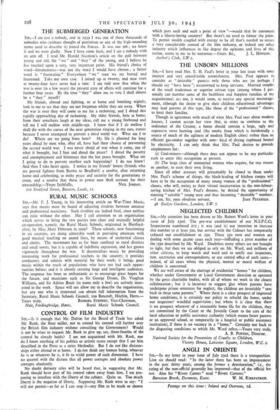RURAL MUSIC SCHOOLS
StR,—Mr. F. J. Young, in his interesting article on War-Time Music, says that means must be found of adjusting rivalries between amateur and professional musicians. Such rivalries are indeed fatal, since neither can exist without the other. May I call attention to an organisation which serves to bring the two parties into close and mutually helpful co-operation, namely, the Rural Music Schools, originated in Hertford- shire, by Miss Mary Ibberson in 1929? These schools, now functioning in six counties, are doing admirable work in providing amateurs with good musical teaching on sound lines, by means of orchestral classes and choirs. The movement has so far been confined to rural districts and small towns, but it is capable of indefinite expansion, and has grown vigorously throughout the war. It decentralises music by providing interesting work for professional teachers in the country; it provides conductors and soloists with material for their work; it brings good music within the reach of populations who have not had such oppor- tunities before; and it is already creating large and intelligent audiences. The response has been so enthusiastic as to encourage great hopes for the future, and musicians such as Sir George Dyson, Dr. Vaughan
and Sir Adrian Boult (to name only a few) are actively inter- ested in Williams,he work. Space will not allow me to describe the organisation, but any one who is interested can obtain full information from the Secretary, Rural Music Schools Council, i09 Bancroft, Hitchin, Herts.- Yours truly, BARBARA STEPHEN, Vice-Chain/KM, Hale, Fordingbridge, Hants. Rural Music Schools Council.






















 Previous page
Previous page